Greenpeace Blog: From the Raukumara to the Arctic
The final frontiers of oil
By Greenpeace NZ online communications specialist Nick Young
After working with Greenpeace and te Whānau-ā-Apanui to stop deep sea oil drilling in the deep waters of the Raukumara, I’m now on board the Greenpeace vessel Arctic Sunrise, near Greenland. Together with our fellow ship the Esperanza, we are here in the freezing Arctic seas to once again confront the oil industry.
The blue waters off the East Cape of Aotearoa and the frozen seas of Greenland are very different but something they have in common is they’re both on the final frontiers of the hunt for new oil. Drilling in the Raukumara would be highly risky because of its extreme depths and its relative isolation, but drilling here in the high north would be even more perilous.
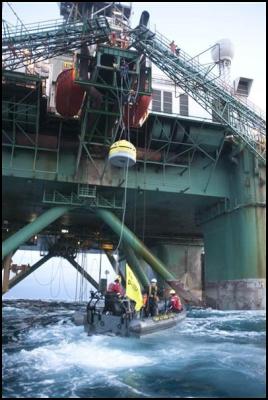
Harsh Arctic conditions, the danger of colliding with icebergs, and the short season makes drilling in the Arctic nothing short of dangerous lunacy.
A few days ago, after searching the North Atlantic, we found the oil rig as it neared Greenlandic waters, travelling with a Danish navy escort - apparently to protect it from us.
On Sunday, three
activists left the Esperanza in fast inflatable
boats, slipped past the navy escort and boarded the
rig.
Luke, Hannah and Sigurd are now hanging from the
underside of Cairn Energy’s giant oil rig in an Arctic
survival pod, with enough food and water to stay there for a
good long time. Their action will prevent the rig starting
its dangerous deep water drilling west of the Greenland
coast. They are equipped with a laptop and camera powered by
solar panels and a small wind turbine which they’re using
to post updates to http://greenpeace.org/arctic
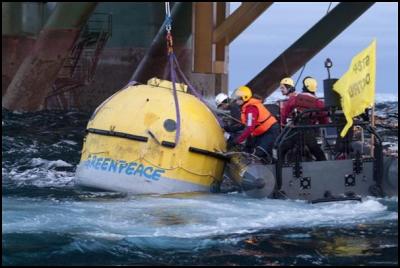
Cairn Energy, the self proclaimed ‘wildcat energy company’ from Scotland is intending that the rig will drill in depths of up to 1500 metres – the same depth as BP’s ill fated Macondo well in the Gulf of Mexico.
Divers can only dive to fix a leak in 200 metres of water. Beyond that, leaks are impossible to fix quickly, as seen with the Deepwater Horizon accident. The Horizon’s well leaked millions of barrels of oil over the almost three months it took to plug it.
A similar event in the Arctic would make the Gulf of Mexico clean up – an effort involving 6500 vessels, seem like a walk in the park.
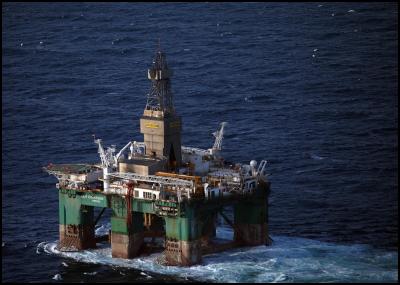
Here in the Arctic, if a spill was not plugged before winter, oil would continue leaking under the sea ice until the following summer. There is currently no known way to recover spilled oil from under ice. Cairn energy have thus far refused to make its oil spill recovery plan public.
The area the rig is in, between Canada and Greenland, is known as Iceberg Alley. The threat from icebergs is so great that Cairn Energy has to employ ships to tow icebergs away from the rig, or fire water cannons at them, in an effort to stop the icebergs from crashing into the rig.
The world's oil giants are watching Cairn’s rig with great interest. If it strikes oil this summer it could spark an Arctic oil rush that will spell disaster. Exxon and Chevron have already bought up Greenland licenses.
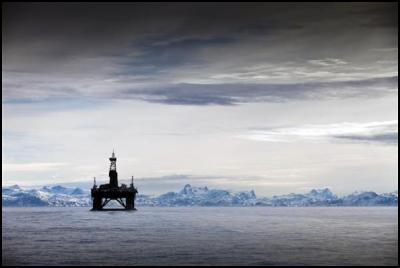
The terrible irony of the situation here in the Arctic is that it is due to climate change that Cairn is even able to consider drilling in an area previously out of reach.
Extracting oil from areas opened up by the climate crisis, will only make that crisis worse.
The dangers are too great and, like in New Zealand, it is the local people, economy and environment that take the real risk – not the oil company.
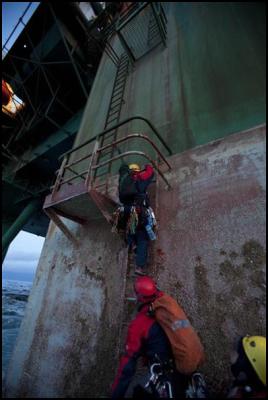
Click for big version
Instead of risking everything to pursue every last drop of oil to the ends of the earth we should be investing in clean energy solutions, and looking to phase out our dependence on oil.
ENDS


 Gordon Campbell: On Why The US Stands To Lose The Tariff Wars
Gordon Campbell: On Why The US Stands To Lose The Tariff Wars YWCA: Global Push Back Against Gender Equality A Growing Crisis In Aotearoa
YWCA: Global Push Back Against Gender Equality A Growing Crisis In Aotearoa Te Pāti Māori: Ngarewa-Packer - Fast-Tracking Seabed Mining Ignores Māori Opposition And Environmental Precedent
Te Pāti Māori: Ngarewa-Packer - Fast-Tracking Seabed Mining Ignores Māori Opposition And Environmental Precedent New Zealand Defence Force: Defence And Customs Strengthen Maritime Security With Uncrewed Surface Vessels
New Zealand Defence Force: Defence And Customs Strengthen Maritime Security With Uncrewed Surface Vessels SPCA: Huge Win With New Dog Tethering Regulations
SPCA: Huge Win With New Dog Tethering Regulations Community Housing Aotearoa: Ngā Wharerau o Aotearoa Says New Partnership Model Helping Ensure Right To A Decent Home Is Realised
Community Housing Aotearoa: Ngā Wharerau o Aotearoa Says New Partnership Model Helping Ensure Right To A Decent Home Is Realised Greenpeace Aotearoa: Babies At Risk Due To Nitrate-Contaminated Drinking Water In Ashburton District
Greenpeace Aotearoa: Babies At Risk Due To Nitrate-Contaminated Drinking Water In Ashburton District


